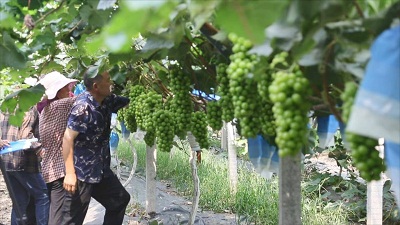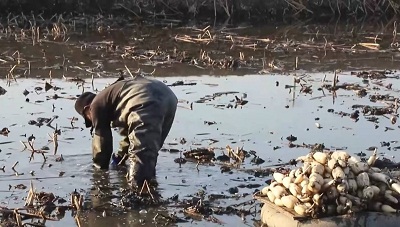Hedong: Thriving industries fuel rural vitalization
Hedong district has prioritized industrial development to drive rural vitalization. By adopting the "co-op + top firm + hub + farmer" model, the district connects small-scale farmers with larger enterprises and cooperatives to boost efficiency and diversify agriculture.
At Xiaoxihe Family Farm in Zhengwang rown, Hedong district, Sunshine Rose grapes have yielded over 15,000 pounds per hectare. The farm uses only organic fertilizers to maintain high quality.

Farmers pick Sunshine Rose grapes. [Photo by Zhong Jiping/for chinadaily.com.cn]
The town has added nearly 50 new projects, including rose planting, cattle ranching, and pet dog breeding, strengthening its agricultural sector. It plans to continue expanding in grain, vegetables, and livestock by focusing on agricultural scale, sustainability, and branding.
In Baho town, lotus root farming has been very successful, with high demand in local markets increasing villagers' incomes. Collaborations between cooperatives and key sales enterprises have expanded sales channels, with some farmers earning 30,000 yuan ($4,143) per hectare. Other specialty products, such as strawberries and golden pears, also contribute to the region's economic growth.

Farmers dig lotus roots from the pond. [Photo by Zhong Jiping/for chinadaily.com.cn]
By promoting the "one town, one specialty; one village, one product" model, Hedong district encourages specialization, where each town or village focuses on producing a unique product. This strategy is driving rural vitalization, increasing farmers' income, and helping the district achieve its broader rural vitalization goals. (Edited by Lin Li)








